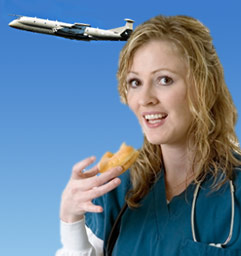Tips for healthy travelling
By Akhila Thyli Hemanth | 14 Jan 2009
Travel whether it is for work or recreation or just obligatory, is an integral part of every person's life. In fact, the number of people travelling internationally has been increasing every year, and according to the World Tourism Organisation (WTO) statistics, 846 million people, on an average travel internationally every year with, a 5.4 per cent increase in the 2006 statistics report. WTO states that fifty-one per cent (410 million) of the people travel for leisure, recreation and holiday; business travel accounted for 16 per cent (131 million) and 27 per cent (225 million) represented travel for reasons such as visiting friends and relatives, religious purposes and for health treatment. The reason for travel for the remaining eight per cent was not specified.
| According to the WTO that fifty-one per cent (410 million) of international travel is for leisure, recreation and holiday; business travel accounted for 16 per cent (131 million) and 27 per cent (225 million) represented travel for reasons such as visiting friends and relatives, religious purposes and for health treatment. The reason for travel for the remaining eight per cent was not specified. |
With such an upsurge in international travel the risk of ill-health is increased. Factors such as a change in temperature and humidity, altitude, environment, and most often the the nature place being travelled to itself, may cause illness. Dr Vasudha A R, a general practitioner, also factors in other causes that increase the risk to health such as poor accommodation, unhygienic environment, inferior sanitation which could cause fungal infections in nether regions, unclean water and even poor medical services. Dr Vivekananda, a vascular surgeon, adds that, "The climate of the destination; the traveller's own body constitution, if susceptible or suffering a underlying medical problem; the comportment of the traveller and immunity levels are some factors that determine the kind of risk a traveller could be exposed to".
To make your trip memorable for all the right reasons and not something you'd sooner forget, we have drawn out, with the help of Dr Vasudha, a few basic guidelines to help ease the discomfort of travelling and the necessary precautions you should take to make long journeys endurable.
Know your health hazards Dr Vasudha strongly suggests that, "Travellers should keep themselves informed about the potential health problems they may face at their travel destination, so precautions and a few preventative measures can be adopted for a less risky, hassle-free trip". She advices a consultation with your doctor at least a week before the journey, and a medical check-up, at least four weeks before the journey, if you're planning to travel outside the country is advisable. She also adds that area specific vaccine is requisitely required.
Dr Vasudha strongly suggests that, "Travellers should keep themselves informed about the potential health problems they may face at their travel destination, so precautions and a few preventative measures can be adopted for a less risky, hassle-free trip". She advices a consultation with your doctor at least a week before the journey, and a medical check-up, at least four weeks before the journey, if you're planning to travel outside the country is advisable. She also adds that area specific vaccine is requisitely required.
Some of the common problems faced by travellers during their journey include cramps, infections due to food and water contamination, abdominal pain and diarrhoea, allergy, deep vein thrombosis (DVT), stiffness and swelling, motion sickness resulting in the feeling of nausea. Travelling into different time zones could give rise to irritability, headache, bloating, dizziness and sleepiness. The intensity of all these problems will vary according to the person's bodily constitution.
Be prepared and take precautions
Dr Vasudha suggests a few preventive and precautionary measures.
Cramps, infections due to food and water contamination, abdominal pain and diarrhoea:
Most often it is not the food itself but the overeating that causes the problems. Be careful of how much you each to aviod indigestion. Eat light, hygienic food and avoid oily food. Plenty of water is a must along with fresh fruit juices. But be wary of where you eat and drink. Also try and get plenty of fresh air. Carry some anti-diarrhoeal in case you suffer from any of these symptoms.
Allergy:
With the dubious cleanliness levels of all modes of transport, allergies are a certainty. Allergy could be due to dust, dirty seats that could have bedbugs, food, air unclean blankets or any other pollutant that could result in rashes, sneezing and watering and itching of the eye. Carrying an anti-allergen is a lifesaver. One way of reducing the risk of allergies is to carry your own bedding.
Motion sickness:
Motion sickness commonly shows up as vomiting and nausea. If you are prone to motion sickness be sure to carry some anti-emetics. Before you set out on a journey keep your stomach relatively light and avoid fizzy drinks. Instead drink things like buttermilk or tender coconut water. Having mints or sour candy also helps to temporarily relieve the nausea during journeys.
Deep vein thrombosis:
Sitting in one position for long periods of time especially in the tiny airplane seats could cause swollen legs especially the calf muscles, and also results in cramping. Such situations can lead to varicose veins and DVT, especially among older or pregnant women. Dr Vivekananda recommends walking up and down the aisle to combat this problem. A little movement increases blood circulation and helps the blood move up towards the heart. He also says that wearing a crepe bandage or stockings will compress the veins and will keep the blood flowing. This can help relieve the swelling and ache in your legs. Wear comfortable, well-ventilated slip-on footwear as these are easier to remove. Remove the footwear and place your feet in an elevated position, using the seat in front of yours as an aid. These few simple practices can help relieve aches and swelling to a great extent.
Hemanth Krishna, an IT professional and a frequent traveller, shares a travel tip: “The cabin hydration levels are much lower than what your body is used to under normal circumstances. So drinking a lot of water or juice, especially on long flights helps me prevent body aches.”
Special care
Dr Vasudha says that there are some kinds of travelers, like the elderly and children, those prone to allergies, pregnant women and people with a pre-existing medical condition, who should take more care than the others.
People suffering from a pre-existing medical condition should carry all necessary medication to last the entire trip. A consultation with their doctor is advisable prior to travel. A copy of the medical prescription with the dosage along with their doctors contact details should be carried at all times.
Medical travel insurance
According to Suresh at Tata AIG (http://www.nriol.com/insurance/tata-aig.html), it is recommended that all people who are travelling should insure themselves, as health care facilities available abroad could be, not just expensive, but unaffordable. Travel insurance will cover a traveller's medical needs and expenses related to it should they fall ill during the trip. The insurance covers hospitalisation following an accident, dental relief and any kind of medical evacuation and repatriation. In the unfortunate occurrence of death while travelling, repatriating of the body could be expensive and difficult to arrange. Do remember to carry a copy of the travel insurance in your hand baggage along with the other relevant travel documents.
Basic medical kit contents for a healthy trip
- Bandages
- Antiseptic solution
- Insect repellent
- Cotton
- Tissues
- Anti-inflammatory medication
- Paracetamol
- Anti-diarrhoeal medication
- Anti-fungal cream medication
- Anti-malarial medication
- Condition specific medication
WHO Checklist
World Health Organisation (WHO) has a medical checklist for travelers:
Obtain information on:
- Local conditions
- Risks related to the area (urban or rural)
- Type of accommodation (hotel, camping)
- Altitude
- Security problems (e.g. conflict)
- Availability of medical facilities
Vaccination
Contact the nearest travel medicine centre or a physician as early as possible, preferably four to eight weeks before departure.
Malaria
Request information on malaria risk, prevention of mosquito bites, possible need for appropriate preventive medication and emergency reserves, and plan for bed-net and insect repellent.
Food hygiene
Eat only thoroughly cooked food and drink only well-sealed bottled or packaged cold drinks. Boil drinking-water if safety is doubtful. If boiling is not possible, a certified well-maintained filter and/or disinfectant agent can be used.
General precautions and preventions
Guard against:
- Animals (beware of snakes and rabid dogs)
- Allergies (use a medical alert bracelet)
- Sun (pack sunglasses and sunscreen)































